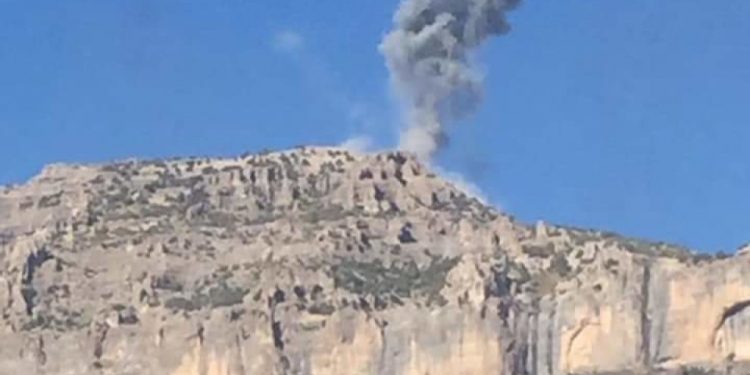ŞENGAL, SOUTHERN KURDISTAN
According to RojNews, warplanes of the occupying Turkish state bombed around Xanesor district of Sengal at around 13:00 local time.
Planes of the occupying Turkish state reportedly targeted civilian residential areas.
It was learned that the drone flights are still continuing in the area. More detailed information on the attack has not yet been obtained.
Şengal (Sinjar)
Since the fall of Mosul on 10 June 2014 to the extremist forces of the Islamic State of Iraq and Syria (ISIS), the situation in the Kurdish regions of Syria and Iraq had deteriorated rapidly.
The Syrian conflict provides the background to the attacks by ISIS against Şengal (Arabic: Sinjar), Rabia, Makhmur and Hewler (Arabic: Erbil). After the fall of Mosul to ISIS on 10 June 2014, the extremist group was able to reinforce its attacks on the Kurdish regions of Syria, by transferring heavy artillery, tanks and advanced weaponry from Mosul to their bases in Jarablus, Tal Abyad and Raqqah in Syria. From these three locations, the heavy weaponry was used in a major military offensive against the Kurdish region of Kobane, between June and late July 2014.
Facing an existential threat from the attacks by ISIS, the people of Kobane mobilized en masse to protect themselves and their autonomous administration. The YPG was ultimately successful in repelling ISIS’ attacks from all three fronts, after a heroic month-long resistance. As their military plans failed in Kobane, ISIS opened a new front in Cizirê, initiating an offensive on Hasakah city and its surroundings, which are in close proximity to the Syrian-Iraqi border. After days of fierce urban clashes with the YPG units, the ISIS offensive was forced back and eventually halted.
On 3 August 2014, ISIS attacked the ancestral homeland of the ancient Ezidi community, located less than 50km from the Syrian-Iraqi border, west of Mosul in the district of Şengal (Sinjar). ISIS controlled the district, including Şengal town, within 24 hours as Kurdish Peshmerga forces withdrew from their positions. ISIS fighters did not make any distinction between civilians and combatants in the Şengal region. When there were no Kurdish Peshmerga forces left, they launched systematic and indiscriminate attacks on the civilian population. The exact numbers of dead, wounded, hostages and disappeared persons are still unknown, however, local reports speak of 1500-2000 dead civilians as a result of summary executions, killings and starvation or dehydration.
As the Kurdish defence line fell in Şengal, the Ezidi community was subjected to brutal, systematic and unrestrained attacks by ISIS. Militarily, ISIS commanders regrouped their forces and heavy artillery for an offensive on the border town of Rabia. The genocidal attacks on the Ezidi Kurds in conjunction with ISIS attacks on Rabia and the withdrawal of the Peshmerga forces urged armed units from YPG to intervene immediately from western Kurdistan (Syria) to protect fleeing civilians and open humanitarian corridors for the stranded people in Mount Şengal. This critical intervention by the YPG in the early hours of the conflict saved thousands of lives and prevented ISIS from controlling more territory in rural areas west of Şengal, including the strategic border-town of Rabia.
Meanwhile, the military commander of the Union of Communities of Kurdistan (KCK), Murat Karayilan, declared in a video statement on 4 August 2014 that the People’s Defense Forces (HPG) would also intervene to protect the Ezidi Kurds and fight along other Kurdish forces, including the YPG and the Peshmerga, against ISIS. PKK army, HPG exhausted all forces in the battles against mobs to free the community.
The following day, 5 August 2014, ISIS elements initiated an attack in the district of Makhmur with the objective of capturing Makhmur town and the Makhmur refugee camp, with a population of 13,000 Kurds from northern Kurdistan (Turkey-occupied). The refugee camp has been under the official protection of the UN since 1998. The camp management had evacuated women and children in the camp on 4 August 2014, as a part of preemptive security measures. Heavy clashes followed in the Makhmur region between Kurdish fighters from HPG, YPG and Peshmerga forces against ISIS. Fierce fighting and shelling have also been reported around Makhmur refugee camp since then. The joint Kurdish forces have been able to repel ISIS attacks and are now in full control of the regions.




